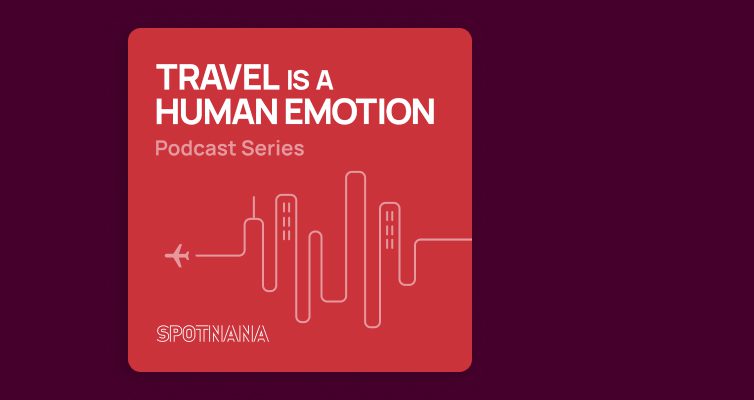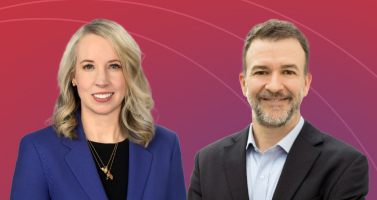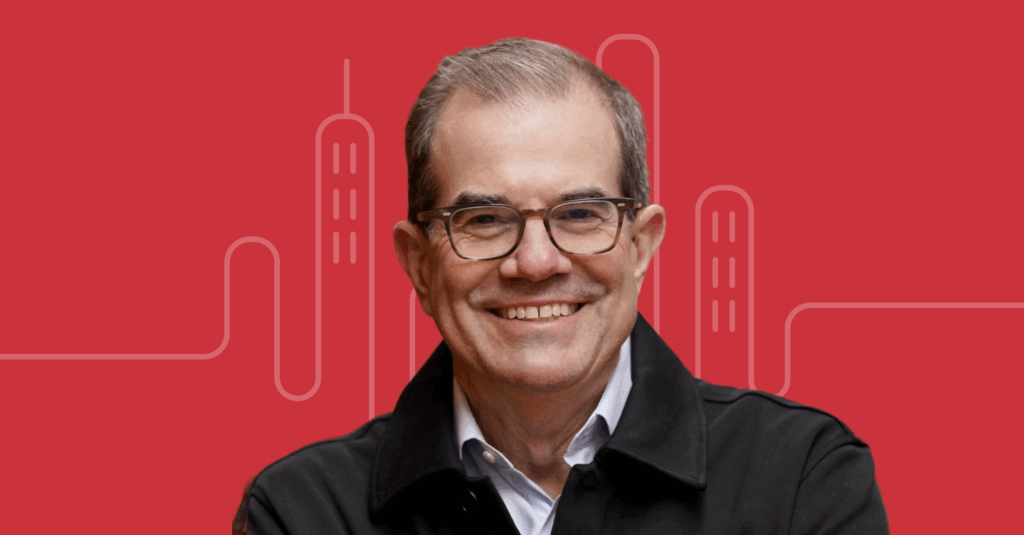The ‘intrapreneurial’ travel manager with 490 Consulting’s Greeley Koch
Guest: Greeley Koch, Managing Director at 490 Consulting
Host: Justin Schuster, SVP of Marketing at Spotnana
Length: 27:11
Justin Schuster spoke with Greeley Koch, Managing Director at 490 Consulting and an adjunct professor at NYU’s Tisch Center of Hospitality, to discuss why an intrapreneurial mindset has become a new superpower for travel managers, how to cultivate the skills required, and why this approach is critical for improving traveler experiences.
Greeley Koch: So you can’t think about, if I do this and it bombs, am I going to lose my job? And I think the travel managers that are the entrepreneurs they’ve built up that gravitas, if you will, within their companies and have built up a reputation of we’ll try things. They might not always work. We’re going to always be trying now.
Justin Schuster: Thank you for tuning in today to The Travel is a Human Emotion podcast. My name is Justin Schuster and I’m the SVP of Marketing at Spotnana and I’m very excited to share that my guest today is Greeley Koch, Managing Director at 490 Consulting and also an adjunct professor at the NYU Tisch Center of Hospitality and Greeley, we were both just at the GBTA conference last week. I’m curious to ask you, did anything about this year’s conference stand out for you?
Greeley Koch: First of all, thank you for the opportunity, Justin. It’s good to be here and be a part of this podcast, talking about travel as a human emotion. So I’m very excited about this, so thank you.
And yes, GBTA, I think hopefully you’ve recovered. I know I took a few days to recover afterwards and I think, when I think about the conference and what stood out for me. Probably two things, right? There’s so much innovation going on right now, and there’s still so much confusion. And I saw this in my discussions with both the buy side and the supply side, and I think the other takeaway that I have is AI was everywhere.
I think there wasn’t a booth that I walked by where there wasn’t any mention of AI, people are putting AI into the name of their company. There’s all this stuff flowing around about how AI is going to make everything better, which I think also contributes to the confusion.
That is happening as well. So those are my takeaways in a nutshell from what I saw there.
Justin Schuster: I absolutely agree with you. It seems as though the pace of innovation is only accelerating in the travel industry, and that raises a lot of questions for people about what is possible now and what are the best options to pursue in the marketplace. And as much as people are thinking about the future, I think that there are some big changes on the horizon that are still not fully in people’s mind. In particular, I think, the change to offers and orders that’s coming in the airline industry is gonna be a huge transformation.
And most people don’t seem to be. Thinking about it, they’re still thinking about how to make NDC work and not even necessarily thinking about almost a post NDC world.
Greeley Koch: And that’s the thing, right? You think about, first of all, it’s taken us, what, 10, 11, 12 years for NDC to get to this point.
And people are still digesting that. And here we come along now with AI and all these other things, and I think this is where it just becomes a lot. And you have to, from a buy side, say, where am I going to focus my efforts? What do I need to do in order to make my program work for today?
Let alone, keeping that eye on what’s going to work for tomorrow.
Justin Schuster: And that is a big responsibility for travel managers to think about consumption of innovation and driving innovation within their companies and taking advantage of all the great things that are out there. You led an incredible session that I was able to attend focused on, it was titled The Entrepreneurial Mindset, the New Superpower for Travel Managers.
And this was all about consuming innovation. And let me ask, just to recap, what does it mean to be an intrapreneur and why is this something that travel managers should be thinking about?
Greeley Koch: First of all, thanks for getting up for an 8:15 morning session on Tuesday to come to that.
So appreciate that. First of all, let me take a step back and go through this concept of entrepreneurship on the travel manager side that I created earlier this year because I was. Listening to my clients and I have clients on both the buy and the supply side because I think it’s important to keep your fingers on the pulse of what both are doing.
And I saw this frustration, Justin, on, on the buy side, or let me start with the supply side. On the supply side, here comes these new products and innovations and there were frustrations with the supplier saying, why are these not being adopted faster? More widespread. Then I talk to the travel buyers and hear their frustrations from them because they’re like, got all these things flying at me and I’ve got all these suppliers that want me to look at these products and all these new things, and yet I’m still working on getting my program running for today.
I just saw this frustration and then I started to talk to some travel managers that are really rolling out new things and being innovative with their programs. And what I saw was really a certain type of skillset that they had where in essence they were acting as entrepreneurs within their company.
And hence the term intrapreneurs, right? Because they’re bringing those entrepreneurial skills within their companies to have a much better travel program by looking at the traveler experience and everything else. So I started thinking about this and that’s where I came up with this intrapreneurial mindset, right?
The superpower for the travel manager so that they can have a, or that they’re utilizing a set of skills to really help them have a very methodical way to review new innovation and bring that into the program. So at the GBTA session, we had two great travel manager entrepreneurs, one from Brazil, one from the United States, two different types of companies.
One focused very much on costs. One focused on the user experience, the traveler experience, and we had a really good discussion, I think, and great questions from the audience about what’s worked and what hasn’t worked. And we heard that sometimes not everything goes great. We had one of our speakers talk about some chatbox she rolled out and they didn’t work so well where we had the other entrepreneur, travel manager, entrepreneur saying I’m getting ready to roll out chatbots. So it really brought to focus the fact that companies are different cultures and how companies respond to some of these innovations will be different.
But it was a really good session. Yeah. Where we had that discussion about what works and what doesn’t work and the skill sets that are needed.
Justin Schuster: I couldn’t agree more. I thought it was really interesting how the travel manager that rolled out the chat bot initially put it out there, got some negative feedback, and then figured out how to move from that initial pilot implementation to a rollout that was more successful, taking into account the feedback they received and the other travel manager was rolling out a chatbot was learning in real time from the other person in the room there.
But she developed things entirely on her own, rather being very limited with budget, really having no budget whatsoever. She didn’t let that stand in the way. She was able to figure out how to drive a number of innovations, including building a chatbot on her own. And that was really inspiring. When you think about intrepreneurship, what are some of the key qualities that go into that from a personal perspective?
Greeley Koch: And we saw it in the two travel manager intrepreneurs that we did have on the stage. And I’ve seen it with others that I’ve talked to as I’ve been going out and talking about this travel manager intrepreneurship. I think the first thing, the first skillset is to really stay focused on the purpose, what you’re really trying to accomplish with your travel program versus the process.
And I get it, I used to be a travel manager. Umpteen years ago, and I came from procurement and I was always about the process. What are we gonna do? What’s about compliance? How things flow, how data flows, all these different things. And I’ve seen where companies have been presenting new innovations.
And I can just see the mindset of that travel manager just going to the process. This means I’ve gotta go talk to my IT team and maybe have GDPR concerns, data privacy concerns. Am I going to have to pay for this? Oh, my other suppliers in the ecosystem think about this. Who do I have to go talk to?
Who’s going to push back? And we just get stuck sometimes into the process versus what we’re really trying to accomplish. So the first skill set I say is always stay focused on that purpose. What are you really trying to accomplish? And then back into the process, that’s first and foremost.
The second one is about risks. I think in this day and age, we can do small pilots. Maybe in the past you rolled everything out, the Big Bang approach and with any sort of new program or new innovation. But I think now you can do pilots and test it. Like we heard from Kara on our panel.
She rolled out the chatbots, they didn’t work. She listened and did some pivoting and I think that’s what’s important is, do things in a bite-sized chunk and pilots and be able to pivot. The other thing is resilience. You’re going to encounter resistance. Resistance could be internally within your company when you’re trying to change a process, because some people maybe say wait a minute, will we lose compliance?
Will we lose the ability to shop for fares? All these different things that come up. And plus you might get some pushback from the suppliers, the other, and the, in your ecosystem that you’re using. So you really need that. Resilience to push through that. And then the final one is curiosity.
We all need to be curious, right? There are all these new things that are coming out and I can remember, at the beginning of NDC or some of the other things. Sometimes I’d have to go back and keep rereading it, okay, what does this mean again? And because there’s so many different interpretations, right?
We can talk about NDC and you might have a definition of it. Five other people would have five different definitions of it.
So I think those are some of the skills that I’ve seen with the travel managers that are really being innovative with some of the new items that are out there. And that’s why I qualify them as entrepreneurs.
Justin Schuster: I’m so glad that you’ve spent a good part of this year really spotlighting the people who are intrepreneurs and helping people see the path to becoming that.
If that’s something that they feel that they’re called to but haven’t yet really, dived into the water to experience themselves and laid out a map for people to do this. There is so much innovation out there for people to take advantage of, and I think it’s just, it’s very exciting to see examples of people who are out there doing it.
And now that so much of the software’s moved into the cloud it is much easier to try things and test and fail fast and learn quickly and move on from there.
Greeley Koch: And I thinkthat’s an important piece, Justin, because you can’t be afraid of failure. And I think the travel manager entrepreneurs that I’ve talked to, they’ve built up enough support within their company that allows them to try things and not be afraid that if we try this and it doesn’t fail, it’ll impact my career.
That’s the worst thing. And you, so you can think about, if I do this and it bombs, am I going to lose my job? And I think the travel managers that are the entrepreneurs they built up that gravitas, if you will, within their companies and have built up a reputation of.
We’ll try things. They might not always work. We’re going to always be trying them, and I’ve seen that with their heavy travelers that are so appreciative of them, those companies and those travel managers trying things that you automatically can easily find a test group. People that want to try things because it’s those road warriors that are out there, that are saying, why can’t we try some of these things?
And when you go ask ’em and say, Hey, we’re ready to try it. It might not work, but we’re going to try it. I think it’s liberating if you can get to that point of I’ve got enough credibility within the company and that if we try things and they don’t work, everybody’s okay, but we tried.
No one’s going to lose their job over it. And I think that’s another important mindset of being an intrapreneur, is being willing to fail. But as you said, fail fast. And let’s move on.
Justin Schuster: You are also working with TMCs out there. Are you seeing entrepreneurship as a quality that some individuals at TMCs are exhibiting?
Greeley Koch: I’ve been fortunate because as I, I mentioned, I have clients on both the buy and the supply side, and I’ve had some great TMC clients that are innovators themselves and whether they’re, look, what I see with them is they’re focused on the user experience, they’re focused on content availability, and they’re focused on new business models.
And that’s really helping them because I think. Where we’ve seen some roadblocks to innovation has been when people tried to keep the current business models and commercial terms in place forever, where we know everything is evolving and the state of distribution is evolving and I’ve been very fortunate to work with some very innovative TMCs that are focused on the future and recognizing that these are experience, the content, the business models, the commercial terms, all these things are changing, and you need to adopt, otherwise, you’ll be left behind.
Justin Schuster: I was in a meeting where there was a comparison made with Blockbuster and Netflix and that change that Netflix went through. First you could say, point to how Blockbuster didn’t change and even had a chance to buy Netflix and decided not to, and then Netflix was innovative enough to have almost all of their revenue generated from DVD mail order distribution, and then to cannibalize that to move into streaming.
And that’s some of the mindset that I think TMCs need to be thinking about these days is how do I move into the next generation of technology and architecture and infrastructure in order to be ready for all the innovation that’s out there today and all the changes that are gonna be coming down the pipe.
Greeley Koch: Yeah. I agree. And that’s a great analogy, right? Especially the pivot that Netflix did from DVDs to streaming and becoming their own studio. I think that what I’ve seen in the TMC community is, again, you always have a spectrum. Those that are always going to be out there, early adopters, always trying new things, and those that won’t, they’ll be last and sometimes.
You know that they may be on the lower end of the spectrum, either because they don’t have the internal skillset to help, they maybe don’t have the funding capabilities, to, to pay for any r and d or any sort of enhancements they have. Then you get into the hold, do hold, do we need to build it or buy it?
So I have talked to some TNCs that quite frankly are struggling because they just don’t have those capabilities to do this. And then, when they’re confronted either in an RFP or bid situation where they’re up against others that have brought some innovation, from a messaging and whatnot perspective, they’re just behind.
And I have seen some TMCs that say, we have great service and service at the end of the day will win. And I think that’s important, right? You need to have great service. But this user experience during the searching, the booking journey, is so important nowadays that you just can’t say we have great service and neglect the other thing, because the one term that I, I use in talking to my clients, it’s like this journey orchestration, right? It’s not that these are. Individual pieces, we’re seeing more of the platform, this orchestration between the booking, the pay and expense, and how these pieces are now coming together.
So I think that, the companies that pivot from DVDs to streaming and using that analogy in the TMC world. Pivot from just, I do this transaction to, I’m part of this overall journey and the overall orchestration I think will be lined up for much more success in the future.
Justin Schuster: I think that makes a lot of sense. I wanna ask also while we have a little bit of time together. Sure. You teach a graduate course at NYU focused on corporate travel. I’m not sure, you might be the only person who teaches a course on corporate. Your courses are out there for graduate students. But every year you get to spend a good amount of time with some young people who are smart and, in many cases, learning about corporate travel for the first time. What are some of the things that you hear about from your students about the state of technology and the travel industry?
Greeley Koch: First of all, every time I walk onto the NYU campus and into my classroom, I pinch myself.
I am so fortunate to be here and to be able to teach this corporate travel management class because NYU recognizes that corporate travel within the whole hospitality industry drives a lot of profits and revenues, of course, pre-COVID, but also now, right as we see things fluctuate between leisure travel and corporate travel.
And I’m so fortunate, so I walk in there and get to sit with these students, which. It’s super smart, and we talk about the corporate travel ecosystem, and I have this slide that I put together. I also do some work with Aquis Consulting. We put together this slide. It shows the whole ecosystem.
It’s like one of those spaghetti maps from the old airline maps that you used to see in the magazines. It just shows how crazy this industry is and data flowing and bits and pieces come in. It’s like this Frankenstein that’s been created. And then when we have a new innovation, we just bolt on. So I showed this to the students, Justin, and I’ll never forget this one student said to me, we thought we just pushed a button on our mobile and we got a ticket.
We had no idea that all this craziness is going on behind the scenes. And then we talk about the corporate environment, policies and duty of care and all these things. And I think their minds are just blown about how crazy this is. So what I ask them to do for the semester is they pick a company and they become the travel manager for that company.
Throughout the whole semester. And at the end of the semester, the final is a presentation to a mock leadership team on the recommendations that they would make for that company with their travel program. So what they do is they go through the whole semester and I had one student, we were talking about TMCs, we were talking about new technology, we were talking about Spotnana.
We were talking about all these different things. And the student said, I don’t get this. I don’t understand why everybody isn’t using these new tools that have a great user experience, that have content coming in from all areas. And I just took a step back and smiled because I’m like, these folks are not burdened by the legacy systems that you know the industry is burdened with and that we have to perpetuate the status quo.
So when they make their presentations on what they would change, they’re like, we would change this. We’d change content. We’re going to give our travelers this. And to me it’s so refreshing because they’re coming in and not knowing anything about corporate travel.
And then when they leave, I’ve actually had some that are like, Hey, we kinda like this corporate travel and I’ve shown them different career paths. Because I bring in senior leaders from the supply side. I bring in senior travel managers so that they can see all these different career paths and if we get a few of those saying I want to become part of the corporate travel industry, I think that’s great.
So it’s one of the most rewarding things I get to do. It reminds me that we can’t have these pre preconceived notions. We need to look at this with fresh eyes. We have to bust through the status quo. We need to be entrepreneurial. We need to be entrepreneurial and keep moving the industry forward for the betterment of our travelers and the corporations.
That’s the main takeaway I have from being able to teach this class.
Justin Schuster: What a wonderful way to give back after spending so many years in the travel industry yourself, to be able to share that expertise with others and bring in all the people that are, you’re connected with all the senior leaders in your years in the industry. To be able to help young people see what’s possible and open up their minds to new possibility. I think it’s wonderful.
Greeley I’ll close by just asking the same question that we ask all of our guests since this is the Travel is a Human Emotion podcast, when you think about the relationship between travel and human emotions, what is your reflection on that?
Greeley Koch: I was thinking about this question and I’ve been fortunate in my career. I managed travel, I managed fleet cars. Dining rooms, executive dining rooms, corporate jets, sports tickets, sky boxes, all those things. But when you go to a party or a gathering of people and everybody always says, oh, what do you do?
And when you say travel, nine times outta 10 people go, oh, have I got a travel story for you? So when you think about, travel’s a human emotion, go to any party, say you’re in travel and people will start regaling you with their worst travel stories about the one time I flew this happened to me.
When did that happen to you? 20 years ago. They remembered the worst travel story, even though it was years ago. And I think that’s what makes this so emotional. Because it is so personal and I think that’s what we have to keep in mind. As we go forward in the corporate travel industry, this is emotional.
It’s so personal and people remember every bad story that they’ve or bad experience that they’ve ever had. So to me, that’s what makes this connection, what makes it so emotional, and I think that’s what makes it also so much fun and so much interesting. Has that happened to you, Justin?
Justin Schuster: Yeah. Travel is so accessible to people. I think so many other fields are harder to understand and travel is certainly hard to understand when you start peeling the layers, but it’s something we all experience.
And so for that reason it’s easy to talk about with others outside of all the technical things that we do, and just reconnect with why we love to travel.
Greeley, thank you so much for joining us today. It was a pleasure to have you as a guest and I look forward to all the new things that you’re going be out there bringing towards the industry into new minds at NYU.






